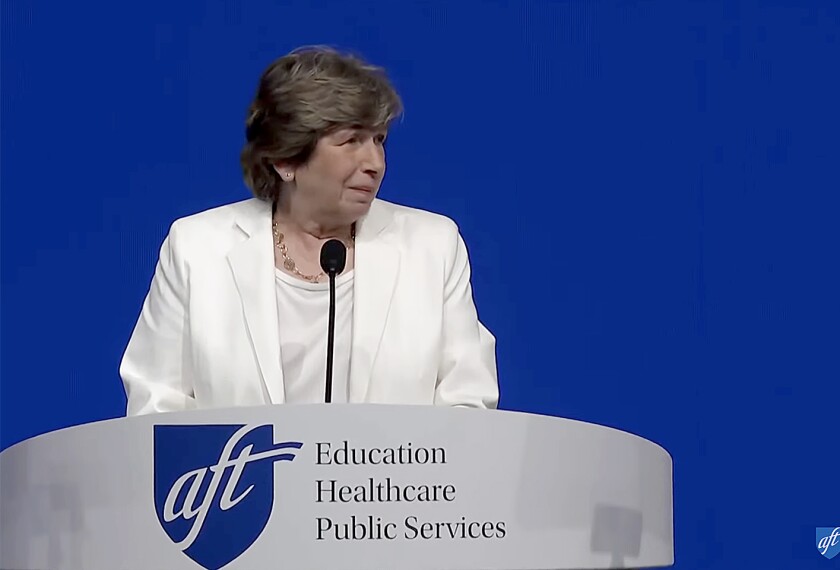A revolution is under way in higher education, one that renders paper college diplomas secondary prizes, and makes electronic accounts of learning the standard for graduates competing in a borderless labor market. This revolution is well along in Europe, and will likely soon spread to Latin America, Australia, and elsewhere.
—Jonathon Bouw

You won’t hear about this revolution or how it challenges your children’s future by reading “A Test of Leadership,” the report issued this fall by U.S. Secretary of Education Margaret Spellings’ Commission on the Future of Higher Education. (“Spellings Unveils Plan for Higher Education,” Oct. 4, 2006.) The commission never looked, never asked, even while it noted that “history is littered with examples of industries that, at their peril, failed to respond to—or even notice—changes in the world around them.”
What does the Spellings Commission do on the international front? It notes, with chagrin, that 11 other countries now sport higher rates of “higher education attainment,” though it’s not exactly clear what that means. And it recommends, almost in passing, increased “emphasis” on foreign languages and international studies, a mechanical mantra of just about every national education commission since World War II. But neither of these nods to the rest of the world tells the American public how much other countries are doing in their higher education systems that we aren’t doing—or even thinking of doing.
Since 1999, the largest restructuring of higher education ever undertaken anywhere has been proceeding in Europe, and in ways that might have helped the commission understand its own issues. Known as the Bologna Process, it affects roughly 4,000 institutions of higher education and 16 million students in 45 countries. From Latvia to Spain, they have agreed to do business in roughly the same way, for the same purposes, with the same rules for degrees, credits, and certification, with the same documentation of student learning, and to have all the pieces in place by 2010. For many of these institutions, set in their ways for centuries, the transformation is a wrenching experience. Observers doubt the 2010 target will be met for this mass convergence, but 2015 looks realistic, and as the time crow flies, that’s a short trip.
Given the core components of the process and the interest expressed by former colonial countries, it is not hard to predict that the Bologna model will be globally dominant within the next quarter-century. The United States cannot afford to sleep through this.
Yet sleep the commission did. What might it have learned from Bologna, had it bothered to do its homework? To illustrate, let us use two cornerstone features of European reform that are related to the commission’s concerns with accountability in higher education.
First, how might we document what college students learn, and how do we then link that documentation to the labor market? The U.S. commission recommends that colleges employ tests of reasoning, communication skills, and general literacy. Students would volunteer to be tested—at entrance and at exit—producing what’s called a “low stakes” setting. The “value added” results would be used to judge the institution and not the student, though whether the volunteers would constitute a representative sample of the institution’s students is doubtful. The commission’s recommendation does not even begin to address the question.
“Value added” was a hot button of the late 1970s, when I was an associate dean at State College, U.S.A., producing trivial statements that we inflated to a level of grand significance. If value added is coming back, one only hopes that measurement techniques have advanced considerably since then, and that interpretation of results is appropriately modest. If I learned something in 27 years with the U.S. Department of Education, it’s not that “what goes around comes around,” but rather that some of these putatively leading-edge constructs pass through phases of faddism with imperfectly understood shapes and consequences, drift away, return in more refined form, and may drift away again. “Value added” is a classic of this genre. You don’t see it in the current European revolution.
Think about it as parents and relatives: Yes, as an inevitable consequence of your daughter’s study of anthropology at Old Siwash and your brother-in-law’s study of management information systems at Sunny Valley Community College, their reasoning and communication skills should improve. But to read the report of Secretary Spellings’ commission, one would never know that your daughter and brother-in-law are attending college and community college to discover and pursue very specific knowledge. One would never know that different sectors of our labor market value people who have studied ritual, kinship, and migration in anthropology, or data warehousing and data mining in management information systems, let alone parallels in clinical microbiology, Japanese history, or packaging design. That is what you want to hear from your daughter or brother-in-law at the family dinner table—and that is what they want to tell you about, what they are proud of learning.
Our public rhetoric is so obsessed with ‘others’ catching up and exceeding us that we fail to see how those others are moving forward together.
And that is the story the 45 Bologna countries are going to tell about their student citizens. To the degree of each graduate in those 45 countries will be attached a standardized “diploma supplement” highlighting the major activities carried out by the student to qualify for the degree.
In addition to describing the context and content of her degree in environmental design, the diploma supplement can bullet the certification exam your daughter passed in computer graphics, the paper on community planning she wrote for the university facilities committee, a short description of her final project on the design of public plazas, documentation of her study abroad in Germany (with particular attention to improvement in her ability to speak the language), a brief notation of her student-team project on animal nesting in public parks, and a certified statement of personal development planning. These particulars are high stakes—there is nothing voluntary about them. Yet they are built into the natural rhythm of the student’s course of study.
This content-loaded portfolio statement is then combined with a standardized curriculum vitae, documentation of all transnational education and training, and a “language portfolio” to produce an electronic Europass that presents the information to prospective employers across the continent—and ultimately, the rest of the world. To the Europass can be added subsequent education and training from certified sources, thus rendering the Europass an indelible documentation of lifelong learning. The student, not the institution(s) the student happens to attend, is the subject. And isn’t the student what education is about?
A second feature of reform under Bologna, the new European Credit Transfer System, does a lot more to facilitate student movement from school to school and from nation to nation than does the U.S. credit currency. Credits were virtually unknown to European institutions of higher education until about 1990, when we started seeing them in the Dutch and Swedish systems. They are now Euro-universal.
Had it looked to Europe, the higher education commission might have offered a creative proposal for rethinking the very value system of our credit currency, and, in the process, added to our tools for judging institutional performance.
Unlike U.S. credits, however, which are based largely on something called “contact hours,” Euro credits are based on student workload, with different weights assigned to different learning activities within a course. For example, the estimated student workload for a course involving two lectures, one section, and a laboratory would account for time spent in lectures, background reading, section preparation, section presentations, laboratory preparation, laboratory-report writing, paper writing, examination preparation, and examinations themselves. Each of these time-on-task commitments is estimated separately, posted publically, then added up, with the whole being assigned a credit value.
Now doesn’t that tell you a lot more about what goes into the core activities and expectations of a college course than the flat U.S. statement of “lecture: 3 credits; lab: 1 credit”? And doesn’t that help you understand better that your daughter and your brother-in-law are not going to Old Siwash and Sunny Valley just to walk around? The secretary’s commission expressed some unease about credit transfer in the United States, where nearly 60 percent of your daughter’s friends will attend more than one school, and 25 percent will pack up the apartment, call the movers, and formally transfer. Had it looked at the Bologna Process, the commission might have offered a creative proposal for rethinking the very value system of our credit currency, and, in the process, added to our tools for judging institutional performance.
What is the core lesson from all this? We went through an unproductive “competitiveness” fad in the 1980s, when, to quote the seminal A Nation at Risk commission report, Japanese automobiles, South Korean steel mills, and German machine tools were our adversaries. The personal computer had yet to be placed in anyone’s home, let alone contained within a cellphone made in China and serviced from India.
Now, in an information world without economic borders, our public rhetoric is inexplicably again so obsessed with “others” catching up and exceeding us that we fail to see how those “others,” as in the nations of the Bologna Process, are moving forward together, and, in higher education, valuing the student as a persisting seeker of knowledge.
If we do our homework better in these matters, we might not just be walking around while the rest of the world moves on.




